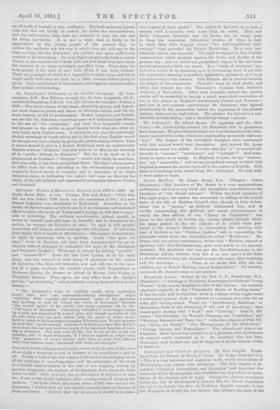Sylvestra : Studies of Manners in England, from 1770 to
1880. By Annie Raine Ellis. 2 vols. (George Bell and Sons.)—" They who did not live before 1789 knew not the sweetness of life," is a now almost forgotten mot, attributed to Talleyrand. According as the reader of Sylvestra sees or fails to see in it an elaborate and sustained effort to prove the truth of Talleyrand's saying, ho will find it enjoy- able or provoking. Tito ordinary novel-reader, indeed, should, in :mercy to himself (and still more to herself), and in fairness to the author, be warned off Sylveetr•a at once. To such it will present much that will irritate, almost nothing that will please. It will seem little better than a bundle of affectations,—affectations in sentiment, in style, in quotation, even in spelling. Could " the good old days," even in Durham, not have been recommended for an in- vitation without attempts to caricature the style of Mr. Gladstone and Professor Tyndall ? What end is served by writing " poetick and " domestick ?" Even the late Lord Lytton, in all his early glory, was not arrayed in such pomp of quotation as the author of Sylvestra, who, from her treasures, new and old, can, in the turn- ing of a page, confront the startled reader with Tragaidabas or Professor Huxley, Dr. Hunter or Alfred de Massa, John Wesley or Th6ophile Gautier. Then, again, one may differ from Mr. Tyndall and the " epoch-making" school, without making faces at them in this fashion :-
" aMr. Ashmead's ways of wording would seem somewhat hoary, now ; and ' our nineteenth-century intelligence' might `visualise' with scandal and amazement' some of his grammar and spelling, as well as 'swoop the curve of discussion' through " the menial spirit' of his creed,---too many centuries old, by fur. The curve of discussion' (charming metaphor !) is no longer swept by a quill, but scratched by a steel pen ; and though to styles of old we owe style, you can now almost hear the grate of mean metal held by numb or skilless fingers scraping illiterate lines. We are as sorry taelose that epoch-making' address at Belfast as to shut Mrs. Betty's oven-door, but one mny have too much of the daintiest dainties of cook- ing or rhetorick. One may cook all day, but to eat all day is not yet possible, and a word•wenrinese,' if I may so express it, might even take possession of men's minds,' were they to read that address until that address were ' saturated with their own thought.' "
Last, and, to the ordinary novel-reader, worst of all, the plot of Sylvestra of so slight a character as not to deserve to be considered a plot at all. Nearly a Ulf of the first volume is devoted to the bringing-abort of the marriage of one clergyman ; and the remainder of the work to a similar consummation, in the case of the haggling wooing by another clergyman, his nephew, of his daughter, from whom the book takes its title. Still, it is only fair to the author- of Sylvestra to take her, if not at her words, certainly after reading some of those in her preface. " As those times [the times before 1789] were not too im- Portunate,.1 wished that my tale should resemble thorn in absence of press and harry. 1 desired that the people in it should be in some- wise typical of their period." The author of Sylrestra is, in fact, a woman with a mission, even more than an artist, Dick and Molly Aslonead, Sylvestra end her lovers, aro so ninny pegs to hang the somewhat Orlandoiso praises of what is best in what Miss Ellis happily terms " the self-complacent half- century " that preceded the French Revolution. To a very con- siderable extent, she succeeds. The book is steeped in that healthy conservatism which protests against the hurry and shoddy of the present day ; and wo would not particularly object, if the authoress merely protested a little too much. As a " study of manners," too, Sylrestra would bo as charming as it is interesting, were it not that the authoress's learning is painfully oppressive, presented, as it is, in quotation form to her readers. Like Tarpoia, she is crushed beneath the weight of her ornaments. Sylvestra must be read slowly, and often, and treated less like Thackeray's Esmond than Burton's Anatomy of Melancholy. After such perusals, indeed, the patient reader will be rewarded by having a much more vivid conception of one or two places in England—particularly Oxford and Durham— and one or two persons—particularly Dr. Priestley—that figured prominently in the generation before the begiening of the present century, than over ho lad before. We predict for Sylrestra a con- siderable private-library—not a circulating-library—success.


































 Previous page
Previous page